Related Research Articles
The Beatles' bootleg recordings are recordings of performances by the Beatles that have attained some level of public circulation without being available as a legal release. The term most often refers to audio recordings, but also includes video performances. Starting with vinyl releases in the 1970s, through CD issues in the late 1980s, and continuing with digital downloads starting in the mid-1990s, the Beatles have been, and continue to be, among the most bootlegged artists.
Apple Records is a British record label founded by the Beatles in 1968 as a division of Apple Corps Ltd. It was initially intended as a creative outlet for the Beatles, both as a group and individually, plus a selection of other artists including Mary Hopkin, James Taylor, Badfinger, and Billy Preston. In practice, the roster had become dominated by the mid-1970s with releases of the former Beatles as solo artists. Allen Klein managed the label from 1969 to 1973, then it was managed by Neil Aspinall on behalf of the Beatles and their heirs. Aspinall retired in 2007 and was replaced by Jeff Jones. Jones stepped down on October 21st, 2024.

Worldwide, the British rock band the Beatles released 12 studio albums, 5 live albums, 51 compilation albums, 36 extended plays (EPs), and 17 box sets. In their native United Kingdom, during their active existence as a band, they released 12 studio albums, 1 compilation album, and 13 EPs. The early albums released from 1962 to March 1968 were originally on Parlophone, and their albums from August 1968 to 1970 were on their subsidiary label Apple. Their output also includes vault items, remixed mash-ups and anniversary box-sets.
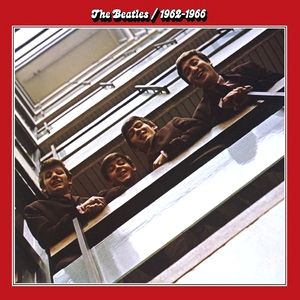
1962–1966, also known as the Red Album, is a compilation album of songs by the English rock band the Beatles, spanning the years indicated in the title. Released with its counterpart 1967–1970 in 1973, the double LP peaked at number 3 in the United Kingdom. In the United States, it topped the Cash Box albums chart and peaked at number 3 on the Billboard Top LPs & Tape chart while 1967–1970 reached the top spot. The album was re-released in September 1993 on compact disc, charting at number 3 in the UK.
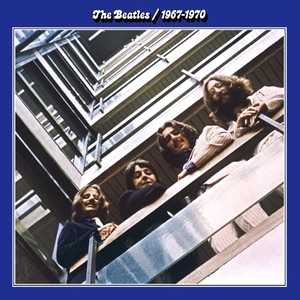
1967–1970, also known as the Blue Album, is a compilation album of songs by the English rock band the Beatles, spanning the years indicated in the title. A double LP, it was released with 1962–1966 in April 1973. 1967–1970 topped the Billboard albums chart in the United States and peaked at number 2 on the UK Albums Chart. It was re-released in September 1993 on CD, charting at number 4 in the United Kingdom.
The Beatles at the Hollywood Bowl is a live album by the Beatles, released in May 1977, featuring songs compiled from three performances recorded at the Hollywood Bowl in August 1964 and August 1965. The album was released by Capitol Records in the United States and Canada and on the Parlophone label in the United Kingdom. It was the band's first official live recording. A remixed, remastered, and expanded version of the album, retitled Live at the Hollywood Bowl, was released on 9 September 2016, on CD for the first time, to coincide with the release of the documentary film The Beatles: Eight Days a Week, directed by Ron Howard.

The English rock group the Rolling Stones have released 31 studio albums, 13 live albums, 28 compilation albums, 3 extended plays, 122 singles, 31 box sets, 51 video albums, 2 video box sets and 77 music videos. Throughout their career, they have sold over 250 million records worldwide, making them one of the best-selling music artists of all time. Billboard ranked them as the 2nd Greatest artist of all time. The Rolling Stones have scored 38 top-10 albums on the Billboard 200 and 8 No. 1 hits on the Billboard Hot 100. According to the Recording Industry Association of America, they have sold 66.5 million albums in the US, making them the 16th best-selling group in history.

A bootleg recording is an audio or video recording of a performance not officially released by the artist or under other legal authority. Making and distributing such recordings is known as bootlegging. Recordings may be copied and traded among fans without financial exchange, but some bootleggers have sold recordings for profit, sometimes by adding professional-quality sound engineering and packaging to the raw material. Bootlegs usually consist of unreleased studio recordings, live performances or interviews without the quality control of official releases.
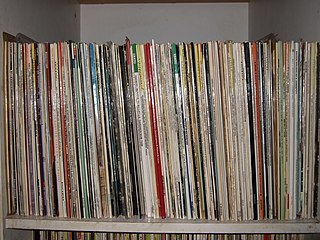
Record collecting is the hobby of collecting sound recordings, usually of music, but sometimes poetry, reading, historical speeches, and ambient noises. Although the typical focus is on vinyl records, all formats of recorded music can be collected.
The discography of English singer-songwriter and former Beatle George Harrison consists of 12 studio albums, two live albums, four compilation albums, 35 singles, two video albums and four box sets. Harrison's first solo releases – the Wonderwall Music film soundtrack (1968) and Electronic Sound (1969) – were almost entirely instrumental works, issued during the last two years of the Beatles' career. Following the band's break-up in April 1970, Harrison continued to produce recordings by his fellow Apple Records acts, notably former bandmate Ringo Starr. He recorded and collaborated with a wide range of artists, including Shankar, Bob Dylan, Eric Clapton and Gary Wright.
The Amazing Kornyfone Record Label (TAKRL) was one of the first bootlegging record labels in America. Kornyfone was based in Southern California in the 1970s. The label released albums from such artists as The Beatles, David Bowie, Bob Dylan, The Grateful Dead, Led Zeppelin, Elton John, Joni Mitchell, Pink Floyd, Genesis, and others. Kornyfone was known for its packaging, with interesting artwork and informative covers.
The Led Zeppelin bootleg recordings are a collection of audio and video recordings of musical performances by the English rock band Led Zeppelin which were never officially released by the band, or under other legal authority. The recordings consist of both live concert performances and outtakes from studio sessions conducted by the band. Many hundreds of Led Zeppelin bootlegs exist, and are widely collected by fans.
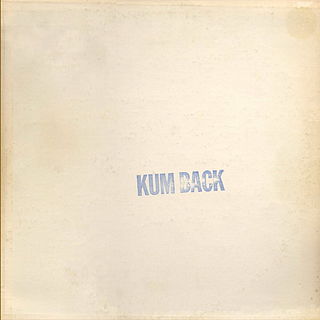
Kum Back is the first bootleg album by the Beatles, released in January 1970. The album is an early version of what would become Let It Be, sourced from a tape recording of an acetate prepared by the band's engineer, Glyn Johns. It is one of the earliest commercial rock bootlegs, the first being Great White Wonder by Bob Dylan which was released several months earlier.
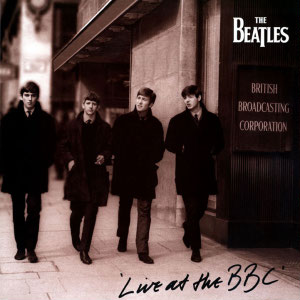
Live at the BBC is a 1994 compilation album featuring performances by the Beatles that were originally broadcast on various BBC Light Programme radio shows from 1963 to 1965. The mono album, available in multiple formats but most commonly as a two-CD set, consists of 56 songs and 13 tracks of dialogue; 30 of the songs had never been issued previously by the Beatles. It was the first official release by the Beatles of previously unreleased performances since The Beatles at the Hollywood Bowl in 1977 and the first containing previously unreleased songs since their final studio album, Let It Be, in 1970.
Trademark of Quality, also spelled as Trade Mark of Quality, was a bootleg record label based in Los Angeles, California, during the late 1960s and early 1970s. The label was responsible for many underground records of Bob Dylan, Pink Floyd, Led Zeppelin, Jefferson Airplane, Devo, Grateful Dead, The Beatles, Frank Zappa, The Rolling Stones, The Who and many other rock artists of the era.
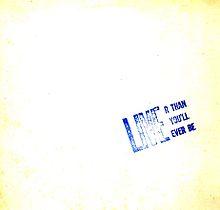
Live'r Than You'll Ever Be is a bootleg recording of the Rolling Stones' concert in Oakland, California, from 9 November 1969. It was one of the first live rock music bootlegs and was made notorious as a document of their 1969 tour of the United States. The popularity of the bootleg forced the Stones' labels Decca Records in the UK, and London Records in the US, to release the live album Get Yer Ya-Ya's Out! The Rolling Stones in Concert in 1970. Live'r is also one of the earliest commercial bootleg recordings in rock history, released in December 1969, just two months after the Beatles' Kum Back and five months after Bob Dylan's Great White Wonder. Like the two earlier records, Live'r's outer sleeve is plain white, with its name stamped on in ink.
Trademark of Quality was a bootleg record label based in Los Angeles, California, and was established in 1970 by "Dub" Taylor and Ken Douglas. In the summer of 1969, they released Bob Dylan's "GWW" Great White Wonder with a white fold-out cover and white labels. Another 9 titles followed before they 1970 created the "farm pig" logo and the TMQ label was fact then they began fastening round fluorescent stickers on the outside of their rubber-stamped jackets which read 'Trade Mark Of Quality,' and bore the profile of a farm pig. The Frank Zappa - 200 Motels release was the first to bear such a sticker. Over time, custom pig labels were added along with xerox insert covers.

"Little Queenie" is a song written and recorded by Chuck Berry. Released in March 1959 as a double A-side single with "Almost Grown", it was included on Berry Is on Top (1959), Berry's first compilation album. He performed the song in the movies Go, Johnny Go! (1959) and Hail! Hail! Rock 'n' Roll (1987). One year earlier, Berry had released "Run Rudolph Run", a Christmas song with the same melody.
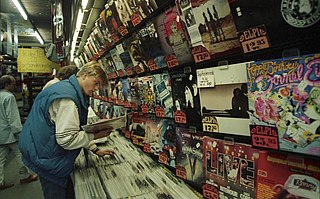
The album era was a period in popular music during the latter half of the 20th century in which the album—a collection of songs issued on physical media—was the dominant form of recorded music expression and consumption. Usually defined as lasting from the mid-1960s until the mid-2000s, it was driven primarily by three successive music recording formats: the 33⅓ rpm long-playing record (LP), the cassette tape, and the compact disc (CD). Rock musicians from the US and UK were often at the forefront of the era. The term "album era" is also used to refer to the marketing and aesthetic period surrounding a recording artist's release of an album.
Ultra Rare Trax was a series of bootleg recordings of the Beatles, featuring studio outtakes, that first appeared in 1988. It took advantage of a legal loophole known as the "protection gap" that allowed bootleggers to release old recordings due to ambiguous copyright laws. In all, eight volumes were produced. It was not the first Beatles bootleg to appear on compact disc but it was the first one to achieve widespread attention with bootleggers, because its sound quality showed what digital remastering was capable of.